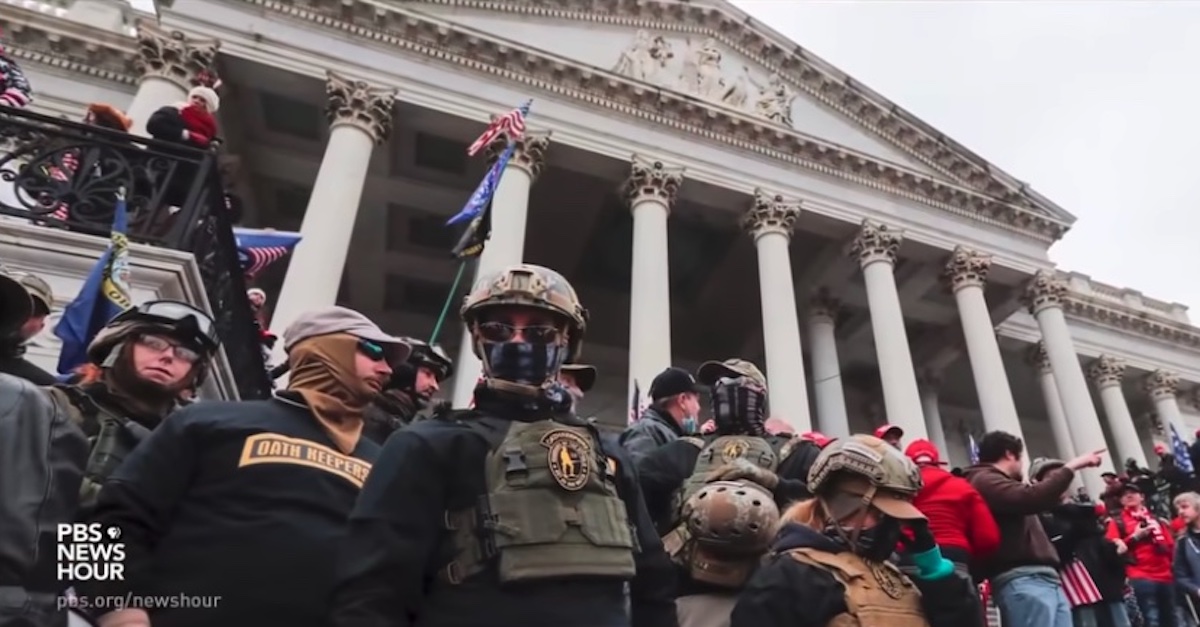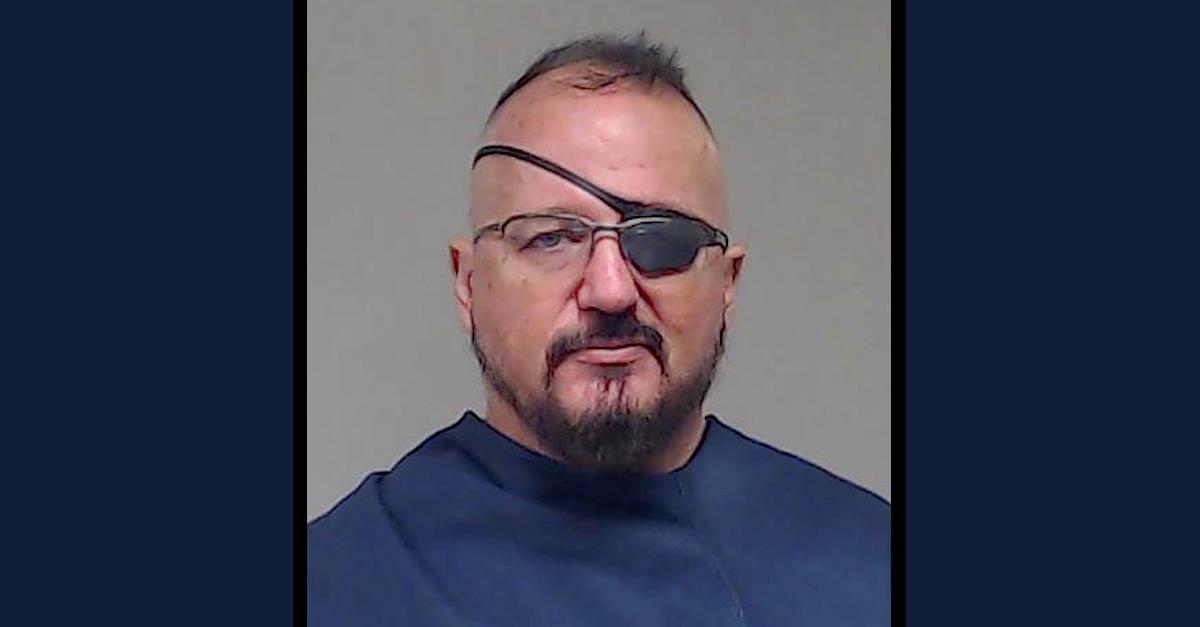
People wearing clothing with “Oath Keepers” labels are seen outside the Capitol on Jan. 6. (Image via YouTube screengrab/PBS NewsHour.)
Jury selection in the federal criminal case against members of the right-wing Oath Keepers group presented a full spectrum of opinions and viewpoints on Wednesday, as the judge and lawyers in the case sought to learn more about the Washington, D.C. residents who would eventually decide the matter.
Potential jurors in the case of Oath Keepers founder Stewart Rhodes, along with co-defendants Jessica Watkins, Kenneth Harrelson, Thomas Caldwell, and Kelly Meggs, faced questions from U.S. District Judge Amit Mehta, prosecutors, and defense lawyers on Wednesday. The five defendants are charged with seditious conspiracy, accused of plotting to ferry weapons to the U.S. Capitol on Jan. 6 as Donald Trump supporters tried to block certification of Joe Biden‘s 2020 electoral win.
If one overarching theme applied to Wednesday’s proceedings, it was the desire to clarify the jurors’ views of the Oath Keepers, which anti-extremist watchdog groups have described as “anti-government extremists who are part of the militia movement” and “militaristic.”
One potential juror, a man who lived close to the Capitol and watched as the chaos unfolded, said that he believed members of the group to be “anti-democratic” and “generally not good people” who are “violent” and don’t respect the rule of law.
Mehta pressed, asking the man if he would be “open-minded enough as as juror” to changing his mind if evidence was presented that contradicted that view.
“Honestly, probably not,” the potential juror replied.
When Assistant U.S. Attorney Jeffrey Nestler asked him why not, the man said that his understanding was that the evidence against the Oath Keepers in the case is “strong.”
“I know what happened,” he added. “It’s pretty cut and dry. I watched it all, basically, from my window.”
Another juror, a man who works for the House of Representatives energy committee, said that he had a “quite unfavorable” view of the Oath Keepers, believing that the group’s members hold “some racist and antisemitic views.”
“I tend to look disfavorably on people who hold racist and antisemitic views,” the man added.
Nestler asked him where he got his information from that led to him holding that opinion.
“Like everybody else: on Twitter,” the man said, prompting some mild chuckles in the room.
Mehta eliminated the man from the jury pool, reasoning that the combination of his opinion of the Oath Keepers coupled with the fact that he currently works for the House makes him ineligible to serve as a juror in this case.
Not all the jurors who were dismissed Wednesday, however, were eliminated due to anti-Oath Keepers opinions. One juror appeared to have a high level of awareness of the group, which apparently set off alarm bells for lawyers on both sides.
“I know I’ve heard about them for some time,” the juror said, adding that she believed that Oath Keepers members were “not just Trump-MAGA” types.
“I think they’re what you call constitutional conservatives, militia, maybe Christian,” she continued, speaking in an apparent stream-of-thought manner. “Probably Christian,” she concluded.
She also said she was aware that she knew “the gentleman with the eyepatch” — a clear reference to Rhodes — to be a so-called “doomsday prepper,” and seemed to be familiar with one of the most memorable images from the Capitol steps that day.

‘Oath Keepers’ leader Stewart Rhodes appears in a Collin County, Texas jail mugshot.
“In the picture, they’re the ones going up the line,” she said, adding: “I know they’re charged with seditious conspiracy.”
It appeared that, in a moment of unity, prosecutors and defense lawyers came to a conclusion fairly quickly that neither side would object if Mehta opted to dismiss the juror: as the woman answered questions from the judge, Nestler could be seen walking to the table of defense lawyers and showing them what appeared to be a handwritten note on a yellow legal pad.
“The parties have no objection,” Nestler said after returning to the prosecutors’ table, signaling to the judge that both sides were in agreement that the woman should not sit on this jury.
Mehta called the attorneys up to his bench for a sidebar, which was not heard by those in the courtroom due to the use of a white noise machine that has the effect of sealing sensitive information from the public without having to interrupt in-person hearings and clear the courtroom.
Moments later, Mehta dismissed the woman from the courtroom.
While Mehta had eliminated one potential juror — the man who works for the House of Representatives — in part because of his connection to Congress, the judge opted to keep another juror who had a direct connection to Capitol Police Officer Harry Dunn, who has been vocal about his experience with the violent crowd on Jan. 6 and his struggles since, and may well be a witness in the trial.
The potential juror, a woman who works in marketing and says she has been in a handful of Facebook groups with Dunn since at least 2016 or 2017 and has met him on at least one occasion, insisted that she would be able to fairly judge his credibility if he were to testify at trial.
Mehta, over objections from Watkins’ lawyer Jonathan Crisp and Harrelson’s lawyer Bradford Geyer, said he believed her.
“All of us asked her, in great detail, the nature of her relationship [to Dunn],” the judge said, noting that that the Facebook groups of which she and Dunn were both members were large, and focused on professionals in the D.C. area.
The woman had “no doubt she’d view testimony [from Dunn] the same way as anyone else’s,” Mehta said, adding that he hadn’t seen “any hint” that the woman wouldn’t be able to fairly judge Dunn’s credibility.
Meanwhile, Mehta opted to keep at least two jurors who expressed outright disdain not for the Oath Keepers but rather for the news media — an arguably ironic twist considering the high-profile nature of the case and extensive coverage of the events of Jan. 6 generally.
One potential juror, a man who said he works at the Bureau of Consular Affairs at the State Department, had said that he doesn’t follow news or politics generally. Nestler asked the man to explain further.
“I just don’t like it,” the man said. “I find the whole thing relatively distasteful.”
Mehta kept him in the jury pool over objections from Rhodes attorney Phillip Linder, who expressed concern over the man’s potential work ties to law enforcement.
“He gave no indication he would be biased,” Mehta said.
Another juror’s attitude toward the media, however, brought a moment of levity to the otherwise serious and businesslike proceedings.
“I don’t like the news,” said one juror, a supervisor in the cardiology department of an area hospital system, in response to a question from Nestler, who had asked her to expand on an earlier statement in which she said she doesn’t keep up with current events or watch the news at all.
“I think it’s boring and for old people,” she added, sparking an outburst of laughter from those sitting in the courtroom, including members of the news media themselves.
By the end of the day, Mehta said he had qualified 36 people as potential jurors in the case. The judge said that he expected to have 45 people qualified by Thursday afternoon, at which point the pool will eventually be further whittled down to 12 jurors plus a number of alternates.
[Image via PBS/YouTube screengrab.]